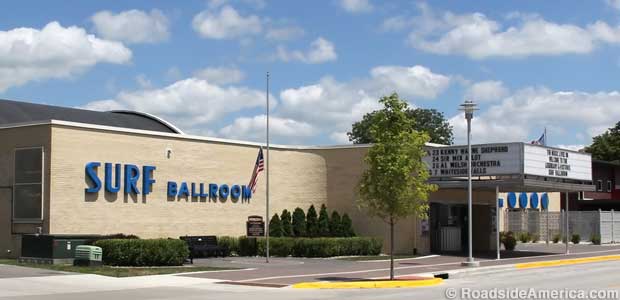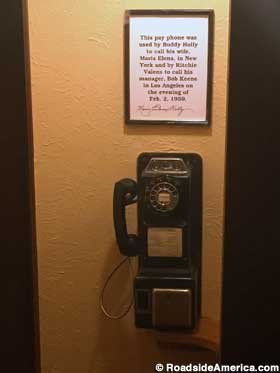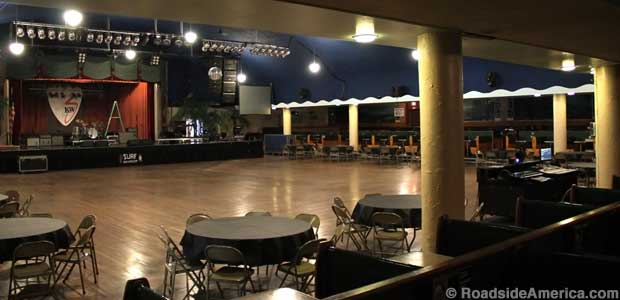
Flag at half-staff outside the Surf Ballroom, which looks the same as it did in 1959.
Surf Ballroom: Buddy Holly's Last Gig
Clear Lake, Iowa
The Surf Ballroom is a loss-of-innocence shrine for fans of rock 'n' roll, the place where early rockers Buddy Holly, Ritchie Valens, and J.P. "The Big Bopper" Richardson gave their last performances on February 2, 1959, just before dying in a plane crash -- later lamented as "The Day the Music Died" in the song American Pie.

Last calls by Buddy and Ritchie were made from this pay phone.
The grim anniversary, now seen as an important event, was ignored for years at the Surf until a bronze "Buddy Holly's Last Performance" plaque was finally unveiled in 1979. By then the Surf, which had opened in 1948, was in danger of demolition, and remained that way until a local family purchased it in 1994 and restored the building it to look the way it did on the day of its most infamous concert. With its old wooden booths and vaulted ceiling, the Surf is a throwback to another era -- and was added to the National Register of Historic Places in 2011. Visiting this time warp of an attraction is like visiting the similarly-frozen-in-amber Dealey Plaza; kinda sad, but also kinda cool.
Exhibits in showcases wind their way through the building. One chronicles naughty teenagers' habit of smuggling booze into the ballroom. Another, the Wall of the Forgotten (our name for it), features framed photos of obscure Surf performers such as Padiddle Joe and The Stardusters. One photo, larger than the rest, reveals that early rocker Ricky Nelson also performed at the Surf. He died in a plane crash too.
The Surf Ballroom is still a concert hall, and on the day we visited the roadies from the acts performing that night were marveling at the exhibits devoted to the Surf's most famous doomed musicians. Buddy Holly's cufflinks are on display, as is Ritchie Valens' wallet of death. "His mama carried it with her for years," reads an accompanying sign (Ritchie was only 17 when he died). The Big Bopper's battered briefcase of death is another key exhibit, along with his last hotel room receipt ($3.75) and a copy of Elvis Presley's telegram of condolences, sent to Bopper's family.

View of the dance floor from the wooden booths. Naughty teens would hide booze in nooks designed for ladies' handbags.
The Holy of Holies in this rock 'n' roll temple is the pay phone used by Buddy and Ritchie to make their last phone calls, mere minutes before their demise. The area around the phone booth has been faithfully preserved, right down to the pineapple wall stencils from the 1940s. The booth itself is secured with both a deadbolt and a padlock. The phone number, still visible on the dial, has been disconnected (We tried to call).
Buddy, Ritchie, and The Bopper achieved immortality, although not in a way anyone would have chosen. If they'd have stuck to their original post-concert transportation plan, who knows how long their careers might have flourished? Then the greatest loss might have been felt by songwriter Don McLean -- struggling with the lyric, "the day the music took a bus."




